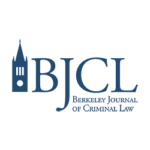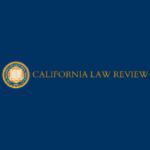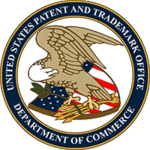
The latest issue of the student-run Berkeley Journal of Criminal Law has just been published, featuring four articles from scholars and law students from across the country. Claire K. Child and Stephanie A. Clark of Vermont Law School analyze the collateral damage caused by the lifetime ban on receiving federal food assistance for those convicted of a felony drug charge; Kristen McCowan, Henry F. Fradella, and Tess M.S. Neal of Arizona State University probe the influence of rape myth-related information in court. In addition, Harvard Law student Lucy Litt examines bias in the federal RICO street gang database, and recent Vanderbilt Law graduate A. Spencer Davies offers a new strategy for regulating the use of facial recognition technology by police.

Trade secret laws are increasingly functioning as a way to shield a wide swath of information from the public, Sonia Katyal writes in a recent Georgetown Law Journal article. She and co-author Charles Tait Graves argue that this new approach is a sea change that in many cases extends protections meant to safeguard intellectual property to nearly all information about a company, product, or even a government loan, in cases running the gamut from employment law to environmental hazards. “The overbreadth of secrecy and confidentiality claims to conceal matters of public concern or other information that should ordinarily be publicly available,” they write, poses a substantial threat to an informed democracy. Katyal and Graves also propose a broad and more narrow path to reform.

Professor Kenneth Ayotte and Christina Scully ’21 challenge a tenet in law and economics in a recent article published in the Yale Law Journal’s online Forum. Using bankruptcies at J. Crew and Nine West as case studies, they argue the assumption that corporate finance contracts are written optimally, leaving little place for bankruptcy law, is an idealized view. In fact, they write, the companies’ stories show that “contracting parties, no matter how sophisticated, cannot possibly imagine and contract to prevent all possible loopholes that other sophisticated parties might exploit,” and that any theory of debt should recognize this inherent complexity.

A research team including Catherine Albiston ’93 has been awarded a $750,000 grant from the National Science Foundation to help the San Francisco Unified School District create a new student assignment system. Albiston, UC Berkeley School of Information Professor Niloufar Salehi, and University of Southern California Professor Afshin Nikzad will assist the district in designing a zone-based system aimed at increasing diversity in schools and predictability for families while maintaining strong connections among students and families in neighborhood schools.

For a second year, the student-run Berkeley Technology Law Journal and the Berkeley Center for Law & Technology are co-sponsoring the Race & Technology Law Symposium, this time with a focus on innovating health equity. This year’s edition is Nov. 10 and adds a third partner, the Coalition of Minorities in Tech Law. The event is virtual and free, and CLE credit will be offered. Click here to register and here to read about the inaugural event.

Orin Kerr spotlights the U.S. Supreme Court’s recent turn toward subjective rules for searches by police officers, and sketches a framework for how judges should choose between subjective and objective tests in Fourth Amendment cases, in a recent paper. “The best path forward is for courts to make context-sensitive decisions based on the potential benefits of narrower subjective rules and the ease of determining intent in suppression hearings,” Kerr writes.

In a recent paper in the University of Colorado Law Review, Leti Volpp juxtaposes the “Migrant Justice Platform,” a set of policy recommendations by a coalition of immigrant rights activists to overhaul the U.S. immigration system, with President Biden’s campaign plan. She describes how the proposal aims to expand our collective political imagination, and outlines how limiting reform pursuits to what is deemed politically pragmatic or reasonable restricts the chance for transformative change.

Seth Davis recently joined an expanded team writing for “D.C. Circuit Review — Reviewed,” a regular feature keeping tabs on the powerful U.S. Court of Appeals for the District of Columbia Circuit published in the “Notice and Comment” blog, a joint venture from the Yale Journal on Regulation and the American Bar Association Section of Administrative Law & Regulatory Practice. Other authors include former D.C. Circuit Judge Thomas Griffith and several litigators.

Despite the United Kingdom’s high-profile “Brexit,” the nation decided to stick with the European Union’s strict data privacy law. In a new paper in Theoretical Inquiries in Law, Paul M. Schwartz evaluates the choice using five models of preference change, finding that each offers clues into the decision. This issue of the journal collects articles written to honor Professor Robert Cooter at a 2020 celebration of his scholarly career.

President Joe Biden issued an executive order in February aimed at reunifying families separated while trying to migrate into the United States, but it’s unclear how to do that. In a recent article in Science, Human Rights Center Faculty Director Eric Stover and his co-authors propose creating a DNA database — which has been successful in identifying remains of missing people — to make the task easier in the many instances where separations happen, including wars and natural disasters.

Amid growing pressure for corporations to adopt a more sustainable and inclusive approach to capitalism, Amelia Miazad, the director of Berkeley Law’s Business in Society Institute, was a key author of the latest report from the Enacting Purpose Initiative. Intended as a practical resource for leaders to enact corporate purpose within their organizations, the report lays out a road map for boards of directors to work with their investors to address societal issues and sustain long-term value creation. Miazad is the North American Chair for the international partnership.

With concerns growing about threats to America’s democracy, Jonathan Gould considers the push for formally enacting constitutional norms into law. In the Georgetown Law Journal, he explores the practical and legal barriers — and concludes codification can be a tool, but isn’t a panacea. “Law can certainly help strengthen constitutional norms,” Gould writes. “But constitutional norms depend on more than just better laws. Better politics are required as well.”

A White House executive order aimed at promoting greater economic competition cited a forthcoming paper from Tejas Narechania showing customers served by monopoly providers — roughly 20% of the country — pay more for worse service than when they’re in a competitive market. Narechania also lays out ideas for how to regulate monopoly carriers to protect consumers.

California Law Review published three pieces as part of the cross-journal Reckoning and Reformation symposium, organized to ask scholars who study law and inequality “to grapple with a moment in which we seem to be at an inflection point of fundamental reformation.” The New York University Law Review’s lineup features an essay from Abbye Atkinson on Philando Castile, school lunch debt, and state violence.

Ian Haney López has been named the 2021-22 William H. Neukom Fellows Research Chair in Diversity and Law by the American Bar Foundation. He will study the connections between electoral rhetoric, racial identity, partisanship, and support for various public policies. The project builds on Haney López’s recent work, including the book Merge Left and the “Race-Class Academy” video series, regarding how best to combat what he calls “dog whistle politics.”

Articles authored by Professors Frank Partnoy, Robert Bartlett, Steven Davidoff Solomon, and Senior Fellow Matthew Cain made Corporate Practice Commentator‘s annual list of the top 10 best papers in corporate and securities law. “The Misuse of Tobin’s q” and “Does Revlon Matter? An Empirical and Theoretical Study” were selected through a poll of academics in the fields from a pool of more than 300 articles.

A proposal from the Center for Law, Energy & the Environment that the U.S. adopt and support international adoption of a methane protocol has been selected as one of the The CLEEN Project’s top three ideas for international partnerships to accelerate pathways to global decarbonization. The protocol provides a framework for tracking, managing, and reducing methane emissions from oil and gas facilities, which generate a quarter of total methane emissions.

Seth Davis and Katerina Linos organized an April 16 symposium on sharing global responsibility for refugees, in keeping with the principles enshrined in the 2018 Global Compact on Refugees. Panelists — including Davis and Linos and fellow Berkeley Law professors Saira Mohamed, Leti Volpp, and David Singh Grewal — explored the political economy of responsibility sharing, including the role of race. The event was sponsored by the California Law Review and the Miller Institute for Global Challenges and the Law.

Lizzy Brilliant ’21 argues that keeping inmates on death row — and continuing to allow juries to hand down new capital sentences — when executions aren’t being carried out violates the Eighth Amendment. Moratoriums like California’s leave prisoners in permanent limbo and confuse jurors, so stopping new capital trials and sentencing is “the only constitutionally permissible judicial solution,” Brilliant writes.
Title: Unjustified Punishment: The Eighth Amendment and Death Sentences in States that Fail to Execute
Published in: California Law Review

Abbye Atkinson recently testified before the U.S. Senate Banking Committee about credit, debt, and the widening racial and gender gap. Her testimony drew on some of her recent and upcoming research, including how Congress has encouraged debt among socioeconomically marginalized groups and how that debt burden causes wealth to flow out of disadvantaged communities.

In a California Law Review paper, Asad Rahim asserts that Justice Lewis F. Powell Jr.’s plurality opinion in the landmark 1978 Bakke affirmative action case was motivated more by fear of the further radicalization of college students than by the goal of greater equality. Rahim contests the idea that there were “two Powells” — the pre-court conservative and the left-leaning centrist jurist — and points to similarities in his statements from both eras.
Title: Diversity to Deradicalize
Published in: California Law Review

In these fraught times, commentators often decry the nation’s “political tribalism,” with some citing American Indian Tribe governance as antithetical to democracy — a thesis that also appears within federal Indian law cases. In a recent article, Seth Davis argues Indian Tribalism is at its core compatible with democracy, largely because it leans heavily on discourse and negotiation.
Title: Tribalism and Democracy
Published in: William & Mary Law Review

Pregnancy and childbirth are much more dangerous for American Black women than their white counterparts. Yet the Preventing Maternal Deaths Act passed by Congress in 2018 completely ignores race. Khiara M. Bridges digs into this “racial irony” in a paper that questions whether what she calls the “impoverished discourse” on the topic is creating similarly impoverished solutions.
Title: Racial Disparities in Maternal Mortality
Published in: New York University Law Review

Two professors contributed to a recent book examining the roots — and potential future — of the movement that launched President Donald Trump into office. john a. powell ’73 penned the forward of Trumpism and its Discontents, and Catherine Albiston ’93 wrote a chapter analyzing the changes in sexual harassment law since Anita Hill and how the #MeToo movement has affected the legal debate.
Title: Trumpism and its Discontents
Published by: Berkeley Public Policy Press

Incarcerated people in the federal criminal legal system are uniformly denied privileged email communications with their lawyers. A report by our Samuelson Law, Technology & Public Policy Clinic and the National Association of Criminal Defense Lawyers details misguided policies and concrete harms surrounding this issue — and urges Congress to act.
Title: Preserving Incarcerated Persons’ Attorney-Client Privilege in the 21st Century
Published: On law.berkeley.edu and nacdl.org.

Laurel E. Fletcher’s new article puts the controversy over the law school’s decision to install paintings by Fernando Botero depicting U.S. soldiers torturing prisoners at the Abu Ghraib prison into a broader context and explores what the Boteros have come to mean to the Berkeley Law community.
Title: Let’s Talk about the Boteros: Law, Memory, and the Torture Memos at Berkeley Law
Published in: Berkeley Journal of International Law

Rebecca Wexler exposes injustice in an award-winning paper on how criminal defendants are barred from subpoenaing online communication content — even when it could exonerate them. Using evidence law to assess the Stored Communications Act, she says courts wrongly protect tech companies that use data privacy as a guise for non-disclosure.

COVID-19 has exacerbated concerns that algorithmic decision-making leads to discrimination against people of color. In a paper explaining why efforts to define algorithmic accountability have misfired, Robert Bartlett and three co-authors offer a workable definition rooted in Civil Rights Act case law addressing statistical discrimination.

Analyzing a program that enables federal appellate judges to send Congress opinions that describe possible technical problems in statutes, Tejas Narechania and a co-author see room for improvement. Their paper urges judges to send more opinions to Congress, noting that “the judiciary is uniquely situated to identify problematic statutory text.”

Supreme Court Justice Elena Kagan’s dissent in Seila Law v. CFPB cites a California Law Review article by Stavros Gadinis, noting its finding that independent agencies form the governance bedrock for U.S. financial markets. Gadinis tracks the unraveling of that paradigm, and how politicians have increased influence over banking.

Aaron Edlin and three co-authors won a Jerry S. Cohen Memorial Fund Writing Award for the best antitrust article of 2019 on exclusionary conduct. They examine when competition law and authorities should worry about price cuts by an incumbent monopoly, and propose changes to current U.S. policy that aim to increase consumer welfare.

The Supreme Court will likely soon decide how the Fifth Amendment privilege against self-incrimination applies to compelled decryption of a digital device. In a paper noting why the amendment’s original conception may dictate the ruling, Orin Kerr applies lessons from Aaron Burr’s 1807 treason trial to compelled decryption of cell phones, computers, and other devices.

David A. Carrillo ’95 and Matthew Stanford of Berkeley Law’s California Constitution Center say valuing the Federal Arbitration Act over state substantive law undercuts key authorities for state sovereignty. Their paper calls this conflict “a battle over the republic’s core principles” and urges the U.S. Supreme Court to revisit its interpretation of the Act.

Once feckless in ensuring that local governments in California satisfy housing needs for all income levels, the Dept. of Housing and Community Development is gaining strength. A paper by Eric Biber and Moira O’Neill show why recent bills have buoyed the agency’s role, and how that could fuel more accountability and stronger oversight.

To help level the inequity in corporate leadership roles, California became the first state to mandate board gender quotas in 2018. In a new paper that examines “negative announcement returns” to adopting such quotas, Steven Davidoff Solomon and three co-authors point to shareholders fearing more legislation of non-economic values.

Scores of juvenile justice system youth are subject to electronic monitoring, yet little is known about its effects. A new paper by Catherine Crump finds that tracking young people this way yields troubling results that fail to advance individual rehabilitation and open the door to more invasive tactics. Crump also offers suggestions for reform.

Robert Merges revisits the Hamiltonian origins of America’s patent system, and why they matter today. His recent paper says contemporary administrative law is a poor fit for the U.S. Patent and Trademark Office, and recommends honoring the office’s original mission and its cooperative, interactive relationship with other government branches.

Professor and former dean Christopher Edley edited and co-authored the final report of a study committee he chaired for the National Academies of Science, Medicine, and Engineering. His team spent 18 months designing a national system of K-12 education equity indicators that highlight educational achievement and opportunity disparities.

More companies are going public via dual class stock, where shares owned by the founders or other insiders have greater voting rights than shares sold to public investors. In a paper he co-authored, Steven Davidoff Solomon explains the perils of sunset provisions, a popular compromise allowing dual class stock only if it converts to a single share structure after a set amount of time.

Avani Mehta Sood explores how jurors can become prone to bias and legal misunderstanding when evaluating criminal attempt. Her new paper challenges common notions of attempt law (which imposes liability when a defendant intends and starts a crime but does not successfully complete it), and offers ways to reduce confusion.

“Spit and Acquit,” where certain defendants charged with petty misdemeanors are offered a dismissal or plea deal in exchange for their DNA, is used in Orange County. In a paper that notes issues raised by this method, Andrea Roth shows the problems it poses in the areas of public safety benefits, privacy, and democratic accountability.

While many lawyers think the party providing the first draft of a merger deal ends up with better terms, there was no empirical research until Adam Badawi took it on with a co-author. Their new paper on large M&A transactions with U.S. public-company targets debunks certain myths and finds a “limited” first-drafter advantage.

Corporate bankruptcies often involve fragmented, complex capital structures marked by layers of debt and many subsidiaries. A new paper by Kenneth Ayotte tracks the reasons for this, how investor disagreements on the value of loan-backing assets fuel inefficient liquidations, and ways to reduce costly litigation over valuation.

Growing use of the cloud and its international scope challenges traditional legal authorities that permit access to data stored outside the U.S. Paul Schwartz tracks the instability of American rules in this area. His paper delineates three models of cloud computing to provide greater clarity for courts evaluating international data access requests.

Migration raises questions about the exercise of state power over borders. Sarah Song examines common justifications, and arguments for open borders. Her paper confronts whether a democratic state can morally prevent its citizens from exiting the country and bar migrants from entering, and if so how such decisions should be made.

Bank regulations have long used various restrictions to protect against crises, but Prasad Krishnamurthy shows how recent technological and institutional innovation—and shifting thoughts about competition—now curb the ability to limit it. His paper says certain restrictions can bolster current bank regulation and industry stability.

A study co-authored by Robert Bartlett finds that mortgage lenders charge higher interest rates and earn 11 to 17 percent more profit on loans to African Americans and Latinos than to whites. The study says African American and Latino home buyers pay up to $500 million more in interest each year than whites with comparable credit scores.

A study by Berkeley Law’s Human Rights Center offers insights from 21 nations on ways to prevent child marriage. Commissioned by Save the Children, the study draws upon more than 375 reports as well as interviews with practitioners from around the world. Child marriage affects an estimated 12 million girls each year.

The #MeToo movement prompted organizations to hurriedly create or update anti-harassment protocols. Noting the perils of this tactic, Lauren Edelman’s new article cites how companies often frame incidents as poor management, not harassment, and how the mere presence of a policy routinely prompts courts to shield them from legal liability.

A new study co-authored by Franklin Zimring questions laws allowing the indefinite custody of sexually violent predators after their sentences end. He says research showing California predators are far less likely to re-commit their crime than robbers, burglars, and drug offenders was suppressed because it threatened the legitimacy of state laws.